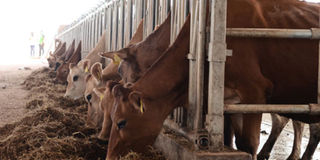Keeping cows free from ticks

Cows feeding on Total Mixed Rations (TMR) at Nakyesasa. A TMR is a method of feeding cows that combines feeds formulated to a specific nutrient content into a single feed mix.PHOTO/GOERGE KATONGOLE
Costs of treating tick-borne diseases will be significantly reduced when the National Agricultural Research Organisation (Naro) releases anti-tick vaccines in 2022.
The revelation was made during Saturday’s third virtual Seeds of Gold Farm Clinic held at the National Livestock Resources Research Institute (NaLIRRI) at Nakyesasa.
Dr Fredrick Kabi, the lead investigator on the vaccine, says they have done six years of experimentation and clinical trials have been more than 75 per cent successful.
He says the vaccine will help to control the Ripicephalus appediculutus, the brown ear ticks, which transmit East Coast Fever. Another study is being done to develop the vaccine for Foot and Mouth disease.
Tick-borne diseases cause an estimated Shs3 trillion losses to the livestock sector in Uganda annually on top of limiting dairy and beef exports from Uganda. Dr Kabi explains that the vaccine will be ready in the next 18 months.
“Government has already allocated funds for the construction of the vaccine manufacturing facility and in 18 months we shall be ready to start the production,” he says.
Dr Kabi says that common tick control measures including; spray race, dipping, pour-on and spraying are no longer desirable as they may also end up harming the environment.
According to him, the vaccine will be applied every six months which will result in less spraying.
“The use of acaricides is harmful to the environment and with the vaccines, spraying should be reduced to once a year,” he notes.
Dr Moses Dhikusooka, a livestock vaccine expert, explained that ticks have become resistant but with the vaccine, he is hopeful that the effects of tick-borne diseases will be under control. He says that ticks will take the antibodies from the vaccinated cow and fall off. “But this will be done with integrated pest management measures,” Dr Dhikusooka says.
Handling the Fall Armyworm
The televised Seeds of Gold Farm Clinic also tackled proper agronomic practices of maize growing including planting, management of diseases, especially the Fall Armyworm as well as post-harvest handling. Maize was studied at the National Crops Resources Research Institute (NaCRRI) in Namulonge.
Dr Michael Otim, the senior research officer in charge of entomology in maize, stressed the importance of managing chemical pesticides in controlling the Fall Armyworm.
“Maize is a key food security crop and its future matters to scientists. But caution must be taken in the use of chemicals while controlling the Fall Armyworm,” Dr Otim said.
This year, the Nation Media Group (NMG) organised three virtual Seeds of Gold Farm Clinics with an aim of bridging the information gap between experts and farmers.
Under the Covid-19 social distancing guidelines, farmers could not access the training centres but with televised broadcasts, they have been able to learn from the comfort of their homes on NTV. All trainings have been broadcast between 4-6pm on television and online platforms.
Farmers were engaged through a question and answer session by dropping queries on social media platforms. The Seeds of Gold Farm Clinic may have been influenced by the pandemic, however, Elizabeth Namaganda, the head of marketing at NMG Uganda, believes the virtual format has the potential to allow many more people to take part, especially with the virtual tutorials still accessible online after the event. “We can look at this as an opportunity to reach more farmers than we actually do in normal days.
This is going to be a learning opportunity for us. You never know we may have to hold the farm clinics virtually,” Namaganda says. All broadcasts are funded by Stanbic Bank and the National Social Security Fund (NSSF) in partnership with Naro.
Note
Tick-borne disease control at NaLIRRI
Ripicephalus appendiculutus or the brown ear tick - transmits East Coast Fever (ECF). A vaccine is under production research at NaLIRRI.
Boophilus tick - They affect mainly cattle, both European (Bos taurus) and Zebu cattle. It transmits babesiosis (Red water).
Amblyoma tick - transmits heart water
Hyaloma tick - transmits «kashanku»




